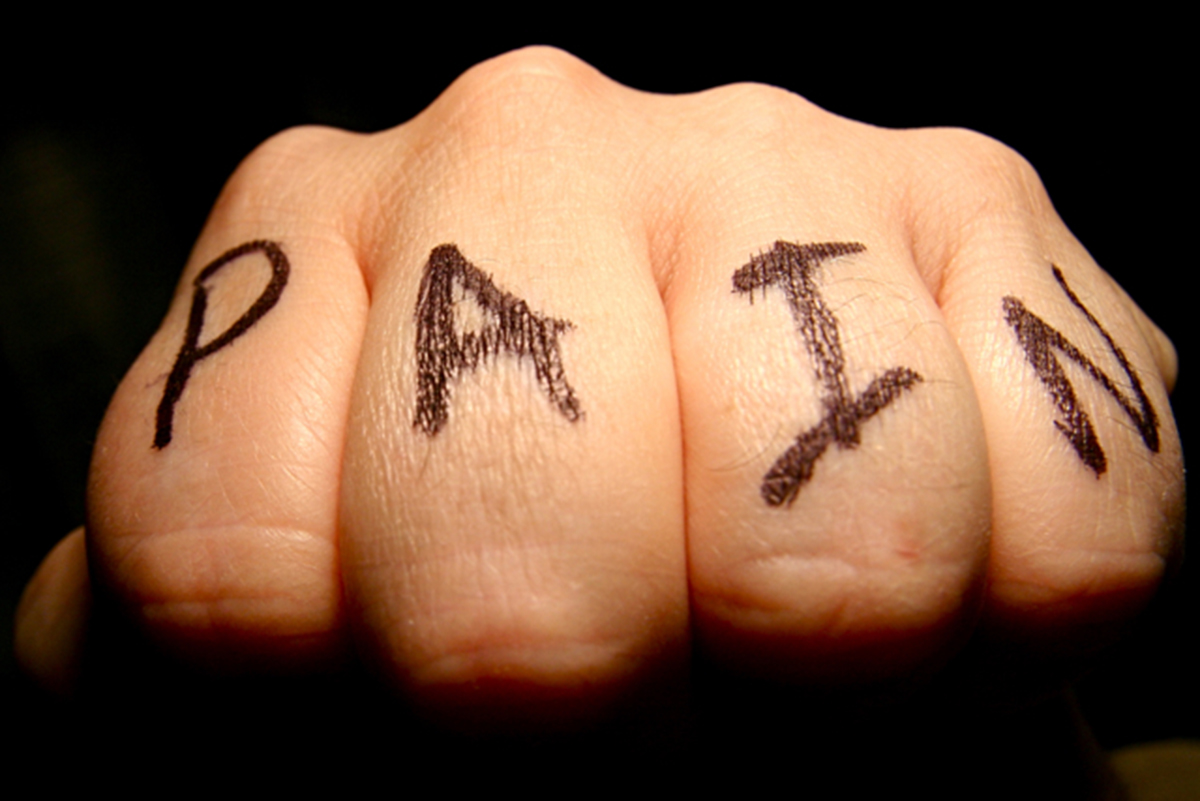We've all heard the phrase "No pain, no gain". The ability to withstand a few aches and pains without groaning, or running off to your doctor, is seen as an admirable trait.
If you've always been proud of your ability to grit your teeth and bear a few minor discomforts, be aware. Being stoic - giving that strange, new pain "just one more day" - could mean that you overlook certain important pains that should send you straight to your doctor.
Here are seven pains that you should never ignore.

Chest, Shoulder, or Jaw Pain
If you're having a heart attack, you may feel pressure in your chest (like there's a heavy weight - a lump of rocks, a rhino, or your Great Aunt Patty - sat on you). You may also feel pain that may improve when you rest, and is often associated with shortness of breath.
This is an urgent symptom.
However, some people don't have pain in their chest. They have referred pain in their shoulder, their jaw, their arm or even - hardest to spot - in their tooth.
If you have chest pain, or nausea and indigestion that don't improve with antacids, see a doctor immediately. If you can't get an immediate appointment, call an ambulance.
The faster you act, the better your recovery.
"The Worst Headache of Your Life"
If you have never had a headache as bad before - you feel that your skull is splitting apart, your head is pounding so bad you can barely see - and no painkiller in your medical cabinet can even begin to touch it, go straight to the ER/Accident and Emergency Department.
Most likely, you're suffering a migraine, or a sinus headache.
READ Natural Remedies For Cluster Headaches
But, rarely, it could be a cerebral aneurysm or a brain tumour. No matter how many headaches you've had before, whether or not you are a chronic migraineur or have hardly had a single headache, the worst headache of your life always requires further tests.
This is especially true if it:
- Worsens when you stand, bend or cough
- Worsens over time, or
- Comes on suddenly
And comes with symptoms, such as:
- Speech problems or confusion
- Fainting
- Vomiting
- Numbness or weakness.
Remember: these causes are unlikely; there are many causes of very severe headaches. But it's always best to get tested.
Lower Back Pain
Most back pain stems from muscular strain following routine activity. However, severe lower back pain can be a sign of several conditions that require medical treatment.
Kidney or bladder infection: - Look out for burning or pain when you urinate; frequent urination, scanty output, foul-smelling urine, and a low-grade fever. Treatment usually requires antibiotics.
Kidney Stones:- Look for intense pain, occasionally extending to the groin and (in men) the scrotum, nausea, frequent and painful urination, and blood in the urine (haematuria). Treatment can involve anti-emetics and painkillers to enable passing the stone at home, or surgical removal of larger stones in hospital (possibly by breaking up the stone with high-frequency waves).
READ Natural Treatment for Lower Back Pain
Kidney tumour:- Look for blood in the urine (haematuria), persistent pain, and a swelling in the kidney area. You may also notice extreme fatigue and weight loss. Treatment usually involves removal of the tumour and chemotherapy.
Some people, especially those with a family history, have back pain before an aortic dissection. In aortic dissection, the main blood vessel that feeds the lower part of the body bursts. This is a medical emergency. See your doctor if you notice back pain, especially if you have: shortness of breath, a weak pulse in one arm compared to the other, or fainting.
More Pains You Must Never Ignore
Abdominal Pain
Do you still have your appendix? Then be wary of any pains in your midsection. Especially pains that:
- Start generally but become concentrated on the lower right-hand side within hours
- Gets worse after your stomach is pressed on.
- Comes with: nausea/vomiting, loss of appetite and fever.
These are all signs of appendicitis. A condition requiring urgent medical attention, where your appendix becomes inflamed.

Appendicitis is not the only serious cause for abdominal pain. Stomach ulcers (symptoms: stomach pain, loss of appetite, heartburn and indigestion), pancreatitis (symptoms: stomach pain, nausea, indigestion and a high temperature), gallstones (symptoms: abdominal pain, high temperature, nausea, vomiting, jaundice, confusion), an ectopic pregnancy rupture (symptoms: abdominal pain, nausea, pallor, and dizziness), and a blocked intestine (symptoms: abdominal pain, loss of appetite, vomiting, constipation, inability to pass gas or have a bowel motion) are all possible causes.
These conditions all require urgent treatment, and all have similar symptoms. So, if you have abdominal pain, seek urgent medical advice.
Calf Pain
A painful, red and swollen calf could be a sign of a deep-vein thrombosis or DVT. Sometimes the DVT finds its way from your leg to your lung, becoming a potentially-fatal pulmonary embolism.
If you've been flying, on a long car journey, or even if you have a sedentary lifestyle you are more at risk of this deadly disease, as are the obese, those over 60, and women who take the birth control pill.
If you notice a red and painful calf, it's important that you see a doctor immediately.
100,000 Americans died with DVT or a pulmonary embolism last year. You don't have to be one of them.
Abdominal Discomfort with Bloating and Loss of Appetite
Have you felt bloated and gassy for more than three weeks? Do you have trouble finishing your potatoes at dinner, when previously you'd have wolfed them down and had room for dessert? If you have these symptoms and pain (and/or discomfort) in your abdomen and/or side, you should book an appointment with your doctor.
If these symptoms are new, or if you've been experiencing them for a few weeks or months, they could be a sign of ovarian cancer, especially if you experience pain, bloating, and loss of appetite daily or almost daily. While some blood tests can suggest if ovarian cancer is present, ultrasound and CT scan are the most accurate methods of diagnosis for this type of cancer.
Book an appointment with your doctor.
READ Peritonitis: An Infection Of Abdominal Layer
Burning Pains in Feet or Legs
If you frequently feel sharp pains in your legs and feet, especially at night, you should see a doctor as you could be diabetic. There are 27 million Americans living with diabetes, of which up to one-quarter are undiagnosed. Many don't know that they have diabetes until they start getting pins-and-needles and pains in their feet and legs, one of the first signs of diabetic neuropathy (nerve damage caused by poor management of diabetes).
Other symptoms of diabetes include increased urination, increased thirst, feeling tired all the time, frequent candida infections (thrush), and blurred vision.
Although these symptoms may seem minor, it's vital that you don't ignore them. Diabetes can develop quickly and lead to severe complications, including the amputation of infected feet and coma.
Early diagnosis and effective blood sugar control can help protect you from many of these risks. So see your doctor today.
Finally, Types of Pains You Should Always Ask About
So, if a pain doesn't match the above descriptions, does that mean it's not worth bothering about?
No!
Here are seven types of pain you should always see your doctor about:
- Pain that comes with fever or chills
- Pain that comes with nausea or vomiting.
- Pain so sharp that it prevents you from moving fully
- Pain in any area you previously injured, or an area where you've had surgery.
- Any pain where there's swelling, bruising, or where the area is newly misshapen or deformed (could be a sign of a break)
- Any pain that is constant or which worsens over time.
- Pain that self-care (rest, ice-packs, over-the-counter medications) does not help.
READ Review Of 10 Most Used Pain Killers
Don't be afraid to see your doctor.
Most of us have a sense that what we're feeling isn't our normal "twinge" that will "clear up in a week or two". However, sometimes - wanting to be brave and fearing we'll be seen as a nuisance - we can try to wait out the pain, hoping it will go away.
The important thing is to trust your instinct.
If a pain feels wrong, go to the doctor. The pain may have a simple explanation. And that's good news. News your doctor will be happy to give you.
Don't suffer silently.
- www.cancerresearchuk.org/about-cancer/type/ovarian-cancer/about/ovarian-cancer-symptoms
- www.cancerresearchuk.org/about-cancer/type/ovarian-cancer/diagnosis/ovarian-cancer-tests
- www.diabetes.org.uk/Guide-to-diabetes/What-is-diabetes/Diabetes-Symptoms/
- www.nhs.uk/Conditions/Appendicitis/Pages/Symptoms.aspx
- www.nhs.uk/Conditions/Cystitis/Pages/Symptoms.aspx
- www.nhs.uk/Conditions/Cancer-of-the-kidney/Pages/Symptoms.aspx
- www.nhs.uk/Conditions/Ectopic-pregnancy/Pages/Symptoms.aspx
- www.nhs.uk/Conditions/Kidney-stones/Pages/Symptoms.aspx
- www.nhs.uk/Conditions/Gallstones/Pages/Symptoms.aspx
- www.nhs.uk/Conditions/Pancreatitis/Pages/Symptoms.aspx
- www.nhs.uk/Conditions/Peptic-ulcer/Pages/Symptoms.aspx
- health.clevelandclinic.org/2015/12/8-aches-pains-shouldnt-ignore/
- www.everydayhealth.com/news/truth-about-traveling-blood-clots/
- www.mayoclinic.org/diseases-conditions/aortic-dissection/basics/symptoms/con-20032930
- www.mayoclinic.org/diseases-conditions/intestinal-obstruction/symptoms-causes/dxc-20168463
- www.webmd.com/heart-disease/features/7-pains-you-shouldnt-ignore#1
- www.webmd.com/women/features/serious-pains#1
- Photo courtesy of cosmic_bandita: www.flickr.com/photos/cosmic_bandita/3699832401/
- Photo courtesy of cosmic_bandita: www.flickr.com/photos/cosmic_bandita/3699832401/
- Photo courtesy of stevendepolo: www.flickr.com/photos/stevendepolo/4129400323/

